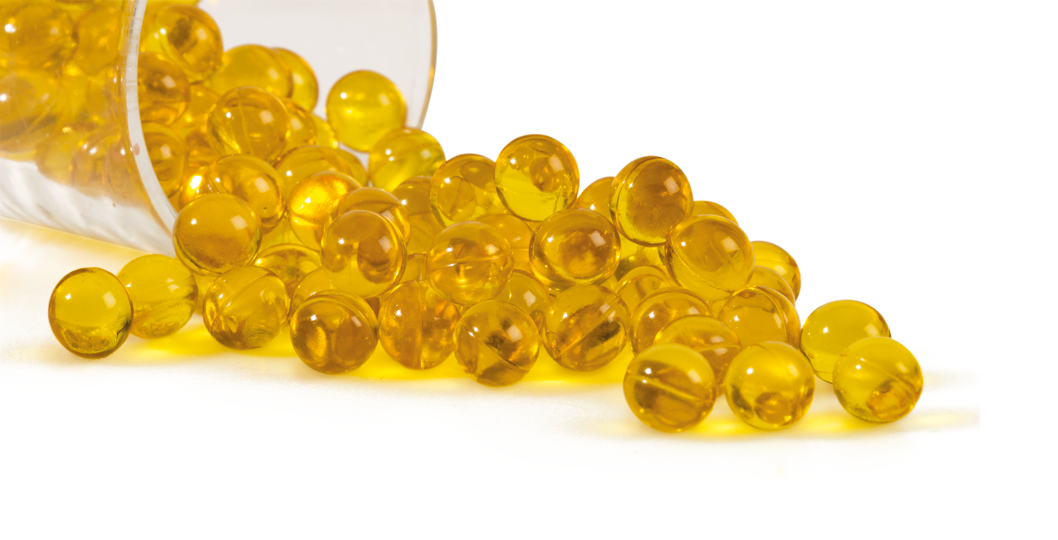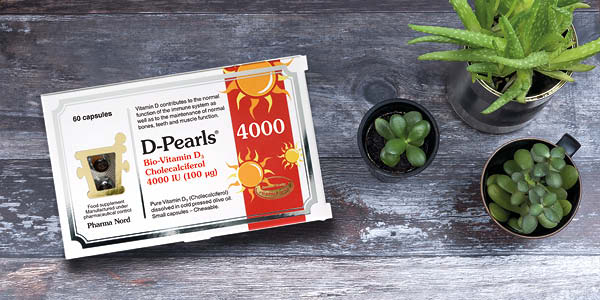Small, high-dosed vitamin D pearls with 500 µg
- D-Pearls with 500 µg (20,000 IU) of vitamin D3 in cold-pressed olive oil
- Documented bioavailability
- For bones, teeth, and muscles
- Supports normal cell division
- Manufactured under Danish pharmaceutical control
D-Pearls 20000iu 500mcg
D-Pearls 20000iu 500mcg
£15.95You save £2.39
Interval
Get your supplements at regular intervals with Autoship. At any time you can cancel the service or change the content or shipping interval.
See how to save with Autoship
The trial which will look at the effects of vitamin D supplementation on the immune system and protecting against Covid-19. This is a huge testament to the quality of our vitamin D supplements! You can read more about the trial on our article. With so many vitamin D supplements to choose from, why choose Pharma Nord?
The trial was also featured on the BBC news! You can see the news report here which also talks about Pharma Nord Bio-Vitamin D:
Why Pharma Nord vitamin D3 supplements?
- Documented bio-availability, proven by science. Bio-Vitamin D3 has been featured in a number of clinical trials which prove their superiority when it comes to a D3 preparation
-
Dissolved in cold-pressed olive oil for maximum absorption. When it comes to supplements, absorption is key for performance
-
Manufactured to pharmaceutical standards - just like all of our products
-
Contain cholecalciferol - a form of vitamin D that is naturally produced in the skin
-
Easy to swallow 'pearl' capsules.
Our video here also explains the difference between pharmaceutical standards and food grade supplements and the huge difference it can make in quality:
What are the benefits of vitamin D3?
Vitamin D3 is a fantastic nutrient that's essential for our overall well-being and boasts a number of benefits, including:
-
Contributing to the support of the immune system. What's more, studies have shown that vitamin D may stimulate the body's production of anti-viral and anti-bacterial proteins.
-
Helping to maintain healthy muscles and nerves
-
Contributing to the maintenence of normal teeth and bones
-
Helping our bodies absorb calcium
What is vitamin D3?
 Vitamin D3 is a fat-soluble form of vitamin D - when you produce this naturally, it's called cholecalciferol.
Vitamin D3 is a fat-soluble form of vitamin D - when you produce this naturally, it's called cholecalciferol.
We produce vitamin D3 in our skin when exposed to adequate ultraviolet light from the sun. However, our modern lifestyles, which tend to keep us indoors, are depriving us of the sunshine we need. Unfortunately, even the foods we eat rarely contain enough vitamin D3 - if any at all!
Our vitamin D3 supplements are easy to take and specially formulated in gel 'pearls'. Vitamin D3 is liposoluble (dissolves in oil), so an oil-based formula is best. Our preparation is dissolved in cold pressed organic olive oil to enhance absorption. They contain the cholecalciferol form of vitamin D3.
Who might be deficient in vitamin D3?
So, what are the symptoms of a vitamin D deficiency? Fatigue, hair loss, back and muscle pain, and even depression can be symptoms of a lack of vitamin D3. More than one billion people worldwide are estimated to be deficient in vitamin D3. The UK government recommends a vitamin D3 supplement for several key groups of people, including:
-
People over 65 years of age
-
Those with low or no exposure to the sun
-
Pregnant and breastfeeding mothers
-
Young children from six months to five years old
What are D-Pearls 20,000 IU?
D-Pearls are small, soft gelatin capsules with 20,000 IU (500 µg) of vitamin D3 in each capsule. This strength is especially designed for weekly use only and should not be taken daily without the guidance of a medical professional.
The product is designed for invididuals with an increased need for vitamin D. Vitamin D is lipid-soluble so the vitamin D content in D-Pearls is dissolved in cold-pressed olive oil for improved absorption in the digestive system. Due to their small size, the capsules are easy to swallow. According to published research, D-Pearls have good absorption in the body
Documented bioavailability
Pharma Nord's preparation (D-Pearls) has been tested by researchers at the University of Oslo. In their study, they supplemented athletes with different doses of vitamin D or matching placebo. The study showed excellent absorption of vitamin D from a low- and high-dosed version of D-Pearls. However, the athletes that took the placebo capsules had unchanged vitamin D levels in their blood.
The illustration shows the difference in vitamin D blood levels over a 4-week period in the group receiving 76 mcg (3,040 IU) of vitamin D daily and in the group receiving placebo capsules.

Source: Baumann ACK. Effekt av vitamin D-tilskudd på 25(OH)D status. University of Oslo, July 2013.
What is vitamin D?
Vitamin D is a lipid-soluble vitamin and needs to be ingested with some kind of dietary fat in order for the intestine to be able to absorb it. Like most other vitamins, vitamin D is essential. There are several kinds of vitamin D, but the two most important forms are D2 (ergocalciferol) and D3 (cholecalciferol).
Vitamin D2 Is only available from the diet. It is produced by certain fungi and plants when they are exposed to ultraviolet light.
Science used to believe that both forms of vitamin D were equally effective in the body. However, depending on what method is used to measure their effectiveness, vitamin D3 is 56-87 per cent more effective than vitamin D2 in terms of raising blood levels of vitamin D. Moreover, D3 is stored in fat tissue more than three times as effectively as D2.*
* Heaney RP, et al. Vitamin D3 Is More Potent Than Vitamin D2 in Humans. J Clin Endocrinol Metab 2010.
Children and nursing home residents have an increased need for vitamin D
Vitamin D has an array of important functions in the body. For example, vitamin D:
- Is important for normal cell division
- Helps to maintain normal bones and teeth
- Contributes to a normal absorption and utilization of calcium and phosphorus
- Plays a role in the body's immune system and muscle function
Sources of vitamin D
We recommend the following:
There are two primary sources of vitamin D: Sunlight and Diet.
Vitamin D from the sun
On the surface of our skin we have a cholesterol precursor that is converted into vitamin D when exposed to UV-rays form sunlight. Once it has been exposed to sunlight it is reabsorbed in the body and converted (hydroxylated) in a two-step process, first in the liver and then in the kidneys and in other tissues. Once these two steps are completed, vitamin D has become active.
Sunlight is our main source of vitamin D but the synthesis is only possible when the sun sits sufficiently high in the sky. In large parts of Europe, this is limited to the period from April through September.
Rule of the thumb
To form vitamin D from sunlight, the UV index must be at least 3 or higher. The UV index is used to measure the intensity of the sun's ultraviolet radiation. If you are in doubt about whether you can make vitamin D from the sun, simply look at your shadow to determine the sun's position in the sky. If your shadow on a horizontal surface in the sun is equal in length to your height, then the altitude of the sun above the horizon is 45 degrees. This position enables vitamin D synthesis.
Vitamin D from the diet
It is difficult to get a sufficient amount of vitamin D from the diet alone, partly because one of best sources of the nutrient is oily fish such as salmon, herring, and mackerel, and people generally do not eat all that much fish. Vitamin D is also found in limited amounts in meat, milk, and eggs. In the plant kingdom, vitamin D is available in small amounts in certain fungi. The best dietary sources of vitamin D are:
|
|
|
Cooking, baking, and frying result in a certain loss of vitamin D from foods.
The need for vitamin D
Strong vitamin D supplements might be particularly indicated in:
- Individuals with dark pigmentation as they require 5 to 10 times more exposure to sunlight to generate same amounts of vitamin D3 as individuals with little or no pigmentation
- Anyone who, regardless of their age, are at increased risk for osteoporosis
- People who do not spend time outdoors in the daytime or generally avoid sunlight
- Adults who wear fully covering clothes in the summer time
- Nursing home residents
- People older than 70 years. An older skin is less able to generate vitamin D3 from sunlight
- Vegans and vegetarians are advised to adhere to the official guidelines for sun exposure and possibly take a supplement of vitamin D during the winter period.
- Blood levels of vitamin D can be determined by a blood test that measures the unit 25-hydroxyvitamin D (25-(OH)D) and is expressed in nmol/L.
Vegans and vegetarians are advised to adhere to the official guidelines for sun exposure and possibly take a supplement of vitamin D during the winter period. Blood levels of vitamin D can be determined by a blood test that measures the unit 25-hydroxyvitamin D (25-(OH)D) and is expressed in nmol/L.
Measuring your vitamin D
The best way to determine your vitamin D status is a blood test. Normal, healthy individuals who eat a balanced diet and are exposed to sunlight generally don't have to worry about their vitamin D status, but certain groups are advised to have their vitamin D levels checked. Science has found that people with dark skin synthesize less vitamin D in their skin that light-skinned people. There is also a relation between low vitamin D status in the blood and overweight and obesity, which is because vitamin D is stored in the body's fat tissue.
Besides obvious vitamin D-limiting factors such as lack of sunlight and unhealthy eating habits, there are more subtle things that can have a negative impact on your vitamin D status. For example, certain types of medicine may impair the body's absorption of vitamin D, thereby increasing the need for the nutrient.
Vitamin D and the normal aging process
Aging affects us differently, depending on our genes and lifestyle. Still, everyone finds that, over time, the body becomes worn out and functions less efficiently. This phenomenon is part of the normal aging process and can also have an effect on our need for vitamin D.
Most of the body's cells have vitamin D receptors (VDR) which are small structures on the cells’ surface that are activated by active vitamin D3. The presence of these receptors in literally all our different tissues explains the universal need for vitamin D in our entire body.
The immune system
It became clear that vitamin D contributes to the normal functioning of the immune system when it was discovered that various white blood cells such as macrophages and dendritic cells as well as T and B lymphocytes are equipped with vitamin D receptors. Vitamin D enables these immune cells to carry out their different functions. For example, it has been shown that vitamin D activates genes in the cell nucleus. These genes encode peptides that inhibit viruses, bacteria, and fungi.
Our immune system reaches its peak efficiency in the teenage years. Even in healthy, elderly people, the immune system is more vulnerable to new infections that it has never encountered earlier. Elderly people produce fewer white blood cells, and the level of inflammation in their body is higher than what you see in younger people. Older people must be sure to get enough vitamin D.
Bone tissue
Our bone mass reaches its peak strength when we are in our 20s and 30s. From that point onward, our bone tissue gradually loses its strength due to demineralization. Vitamin D is necessary for maintaining normal bones and teeth because the nutrient helps us maintain normal calcium levels in bone tissue and in the blood.
From the age of 40, our bonen mass gradually starts to deteriorate. The loss amounts to 0.5% annually for men, whereas women lose twice that amount due to hormone changes.
Muscle function
Our muscles also need vitamin D to function normally. The ability of muscles to contract is dependent on calcium ions. As previously mentioned, vitamin D regulates levels of calcium in the blood and in this is important for muscle function.
As we get older, the number of vitamin D receptors in muscle tissue decreases. This results in a gradual loss of muscle mass and muscle strength. The heart muscle, on the other hand, is not significantly affected by this.
Skin and mucous membranes
It is known that the body produces a precursor of vitamin D in the skin when exposed to sunlight of a certain intensity. Factors that can prevent or reduce this vitamin D synthesis include severe air pollution, too much clothing, dark skin, overuse of sunscreen, obesity, the sun sitting too low in the sky, and old age.
With increasing age, the amount of collagen and elastin decreases, causing the skin to lose elasticity and strength and become more wrinkled. The skin becomes less efficient at producing vitamin D from sunlight, and the digestive tract becomes less efficient at absorbing vitamin D
Official claims
Further information on vitamin D3
Our In-House team including our Senior Nutritionist has written articles on Vitamin D3 :
See related categories
Bio-Vitamin D3 In Research

Related articles

News
Taking vitamin D during pregnancy is good for the ...24/01/2025
New study shows that a daily vitamin D supplement during pregnancy can support the child’s bone heal...

News
Nutrients to support you in the spring02/03/2023
Much like the seasons, our bodies also change throughout the year, so it is important that we mainta...








.png)
.png)
.png)

.png)



.jpg?w=285&quality=100)
.jpg?w=285&quality=100)
.jpg?w=285&quality=100)



